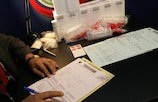Players warned of match-fixing and doping dangers
Wednesday, July 23, 2014
Article summary
It is not only on the pitch that players are learning at the UEFA European Women's U19 Championship, with UEFA holding anti-doping and match-fixing presentations for all teams.
Article top media content

Article body
The UEFA European Women's Under-19 Championship provides a grounding for young players in tournament football, and UEFA have arranged a further educational element with anti-doping and match-fixing presentations for all eight teams in Norway.
Anti-doping: you can't be too careful
Caroline Thom, an anti-doping and medical project manager with UEFA, spoke on the dangers of taking banned substances, whether intentionally or accidentally. "My objective is not to shock you or frighten you," she said. "I just want to avoid you falling into stupid traps. We want to warn and protect you, to make you aware of it. We are here to help."
The players were introduced to the doping control process, with a video from the England v Italy quarter-final at UEFA EURO 2012. Refusing to submit a sample, tampering with a sample and bad behaviour in doping control are all violations. The players discussed the various reasons to be anti doping before Thom reiterated the need to always check medication, which can be different from country to country, with the prohibited list changing every year. "You can never be too careful," she warned.
Spain defender Marta Turmo said the session was a worthwhile exercise: "I thought it was a really interesting speech because it brings awareness to the entire football community that you shouldn't test positive on doping control, that the matches stay clean and that football stays fair for everybody."
An anti-doping quiz subsequently took place at the tournament headquarters in Lillestrom, with the vast majority of players accepting the challenge of answering ten questions within the space of three minutes. Those who scored nine or more entered a draw for a iPad mini.
Sample question: A professional player is tested? (*answer below)
a) four times a year on average
b) once only
c) an unlimited number of times
Match-fixing: red card for life
"UEFA have a zero-tolerance policy towards match-fixing. It means a red card for life." This is the stark message from Barry Bright, a member of the UEFA Appeals Body, as he discussed the dangers of what is now a global problem. Over €400bn is bet on football each year and the UEFA betting fraud detection system monitors 32,000 matches per annum with support from the betting companies, watching out for irregular betting patterns.
Bright describes the three main steps to players, coaches, clubs and referees getting mixed up:
1) They try to befriend you, they look for vulnerabilities
2) You owe a favour, make performance errors, they threaten or bribe you
3) They coerce you to make performance errors
"Those entangled in match-fixing can quickly find them in a criminal net that is difficult to escape from … It can end your career from one day to the next." Players are encouraged to practice the three Rs. Recognise what is happening. Reject it. Report it to UEFA's Integrity Platform. The legal, financial and personal consequences of not doing so are dire.
* c) an unlimited number of times





